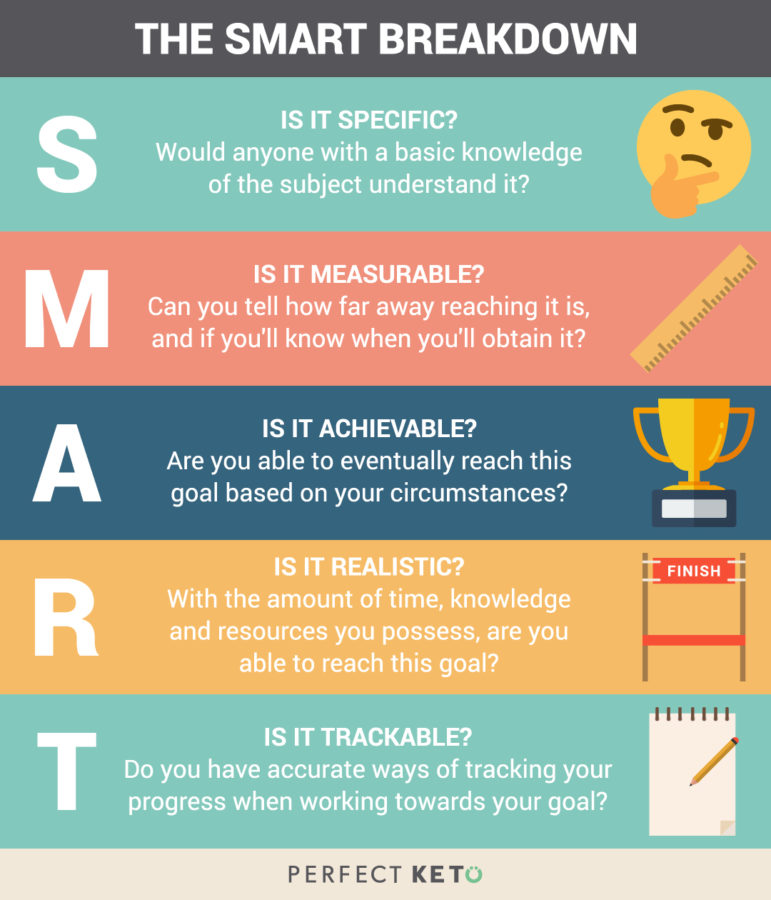Want the keto diet to work for you but not sure how to tell if it is? Time to power up your tracking skills! The only way to know for sure if things are working is by learning how to track ketogenic diet results. Whether you’re looking for weight loss or more mental clarity, we’ll be going over how to best set your goals, and then how to track results in a smart and efficient way. Let’s get started!
SETTING YOUR KETOGENIC DIET GOALS
When setting goals for your ketogenic diet results, make them SMART to cover all of your bases. Each of these components equal a goal that you can feasibly move forward with and begin tracking results. The point is to be working towards something actually attainable for your situation — and that you can easily track for progress. Using the following criteria, decide on what you want to change the most by following the ketogenic diet. Does it fit within the SMART structure? If so, you’re ready to officially set your goal and begin tracking your ketogenic diet results.

TRACKING YOUR KETOGENIC DIET RESULTS
The next step is to determine exactly how you’re going to track these results. Otherwise, it can be a lot like flailing around in the dark trying to hit a target. You can put in 100% effort, but if you aren’t sure where you’re going and how close you are to your goal, it’s going to be frustrating and confusing. Below are some specific examples of goal categories and suggestions for tracking their results.
Track Your Keto Results According to Your Goal
To help you get started, check out our guides on how to keto based on specific health goals, as the method through which you track results depends on what specific goals you want to achieve. Think about the best ways you can accurately measure progress for the goals you’ve set. How can you best see the changes that occur not only day-to-day but also month-to-month and further on?
Some ideas for tracking according to your goals include the following:
If your goal is weight loss:
- Take “before” and “after” pictures to compare.
- Do a body scan or hydrostatic body-fat testing at regular intervals.
- Weigh yourself (but don’t be a slave to the scale, as weight can fluctuate daily and other factors — like body composition — are better indicators.).
- Test your ketone levels daily to make sure you’re in still in ketosis, as that can greatly affect the function of the ketogenic diet for weight loss.
If your goal is an improved mental state:
- Journal daily about how you feel mentally. For example, you might rate your mental clarity on a scale of 1-10 and write about why you used that rating.
- Track your work productivity. Write down how much you worked each day, how many projects you finished, or how many breaks you had to take.
If your goal is better better physical performance:
- Journal about how you feel physically each day, and during workouts. You could rate your energy level from 1-10 before and after each gym session.
- Record specific results you had, such as number of reps, weight lifted, or distance you ran.
- Keep track of what exactly you eat before and after workouts. Keep a food diary along with your other results, and record times and amounts of pre- and post-workout foods you eat.
In every situation, don’t forget to keep testing your ketone levels and recording them each day. Any change you see in results can be directly affected by whether or not you’re in ketosis, so that’s information you must know.
Track Often, and Stick With It
You might feel discouraged sometimes while tracking your results. Don’t let it prevent you from moving forward. The ketogenic diet can involve a lot of tweaking (even Dr. Anthony had to work through some initial ketosis mistakes), so it’s okay if everything isn’t working perfectly right away.
KETOGENIC DIET RESULTS SUMMARY
Before tracking your results, you have to be honest with yourself and make sure to set a goal that is realistic for your situation and resources. Being completely truthful when tracking is important, as having the real stats will help you best move forward and not lose steam even on the days you feel you are not progressing.
Make adjustments as needed.
You might have to alter some things as you go along, and that is okay! In fact, change is to be expected and it helps you stay honest.
Persist through any initial transition.
If you struggle to see any results at first, just know it’s part of the process and that anything can be adjusted. The key is to just keep trying, push through, and change as needed. No matter what goal you’re tracking progress for, test your blood ketones consistently. There will be days when you might not feel great due to other factors; however, the ketone tests may reflect that you are indeed progressing in your ketogenic journey.
Don’t give up!
Having to make changes and adjustments along the way is expected and cine. It’s important to not stop but instead persevere in the smartest way possible. You’ve got this! 🙂